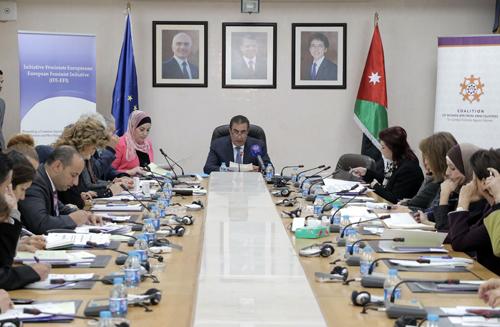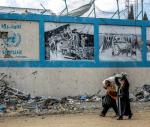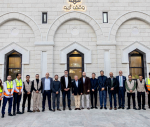You are here
Experts stress need to uphold gender equality in Euro-Med region
By Rana Husseini - Nov 22,2017 - Last updated at Nov 22,2017
CAIRO — Armed conflicts, terrorism and extremist ideologies continue to create challenges for women and gender equality’s advancement in the region, Social Development (MoS) Minister Hala Lattouf said on Wednesday.
“The conflicts in our area resulted in a huge influx of refugees in the region, with around 2.7 million residing in Jordan, which affects us socially and economically,” Lattouf added.
Lattouf’s remarks were delivered by MoS Director of Policies and Strategies Ahmad Abu Haidar on her behalf at the Euro-Med Women’s Rights Civil Society Conference held in Cairo on Wednesday and Thursday.
“Women and children are the most affected by the refugee influx. These challenges require unified efforts and building true cooperation among countries of the Euro-Mediterranean,” Lattouf added.
Abu Haidar concluded the minister’s speech by referring to a quote from one of the organisations that was part of a recent study conducted to evaluate the work of women organisations and the status of Jordanian women, stating: “Give me a fair system towards women and I will give you a future of fair society. Give me a discriminatory system against women and I will give you a world that is drowned with abuse and darkness”.
Head of the EU Delegation in Egypt, Ambassador Ivan Surkos, reiterated the EU’s stand towards women’s advancement and empowerment in the region.
“We reiterate our commitment to women empowerment and gender equality. Our key priority is to promote the role of a proactive civil society in advancing women’s status and in contributing to sustainable and inclusive development,” Surkos told the gathering.
“We want to ensure that no one is left behind because of gender,” Surkos stressed.
Also speaking at the opening session was president of Egypt’s National Council for Women, Maya Morsi, who said that the women’s movement in Egypt came up with a strategy, which was upheld on March, stating that the grassroots leading to decision makers to fully empower women by the year 2030.
“The government and civil society joined hands to implement the strategy together and we are hopeful that it will play an important role towards gender equality in Egypt,” Morsi added.
Some 120 participants from 25 countries are taking part in the two-day conference funded by the EU
Director of the Arab Women’s Organisation in Egypt, Ambassador Mervat Tallawy, said during the first panel that “the sectarian wars in the region have dragged women’s rights backwards and stripped them from a lot of the gains they have made over the years”.
“Slavery is back. Selling of organs and human trafficking and violence against women and women exiting education are too,” Tallawy said.
Speaking during the second session, Secretary General of the Jordanian People’s Democratic Party Abla Abu Olbeh stressed that “we have to work on improving the justice and equality system in our area to face the violence that is becoming more vicious in our countries and some European countries”.
“Our region is going in two directions: one that is calling for justice and equality and another that is trying to drag us backwards with all kinds of extremist thoughts, slavery and enslavement of our people and, of course, women and children are the most affected by this,” she said.
Therefore, Abu Olbeh added, the Euro-med project is important “to help empower and guide us in the future”.
Building on the achievements of the Gender Regional Platform policy dialogue, the meeting aims to foster, widen and consolidate the sustainable regional dialogue on gender equality with stakeholders, as well as to provide a space for women’s organisations and networks from the Euro-Med region to come together, strengthen their common discourse and issue concrete requests and recommendations for the 4th UfM Ministerial Meeting to be handed to the ministers on November 27.
“What is happening to societies in the region is destruction”, Tallawy added, saying “it will be very hard to rebuild. We should not allow this, nor should we allow anyone to support terror groups. Whoever supports terrorist groups should be considered as a war criminal”.
Co-President of the Euro-Med Feminist Initiative Lilian Halls- French spoke about the latest progress that resulted from the dozens of dialogues conducted over the years with civil rights organisations, gender experts, government officials, academics, researchers and media.
“We are facing global regression of women’s rights in the region. The rise of the political and religious extremism, in addition to the economic crisis, are pushing women’s rights to the bottom of the political agendas,” Halls-French stated.
The combination of these challenges, Hall-French added, “is contributing to limiting women’s rights and freedoms as freedom of expression and putting pressure on the civil society”.
“We need to strongly support the independence of organisations and civil society by respective governments in the region,” Halls-French stressed.
President of the Advisory Committee for the Prevention and Combating Violence in the Family in Cyprus Susana Pavlou, pointed to the extreme cases of violence witnessed in the EU countries, saying that “50 women die every week in domestic violence cases, while violence against women cost 226 billion Euros every year in the EU”.
Pavlou, who is also an expert at the Council of Europe, stressed that there are low reporting and conviction rates as “women tend to withdraw in the process of trial against their aggressors because they feel there s no adequate support system and they are being blamed for the violence”.
Related Articles
AMMAN — Minister of Social Development Hala Lattouf last week stressed the need to further strengthen women’s role in the Mediterranea
AMMAN — New challenges in the region — including the refugee crisis, terrorism and extremism — are affecting the well-being of women and chi
AMMAN — Women’s activists on Monday met with Lower House MPs to discuss the outcome of a study on the Euro-Med Ministerial Conclusions on St

















